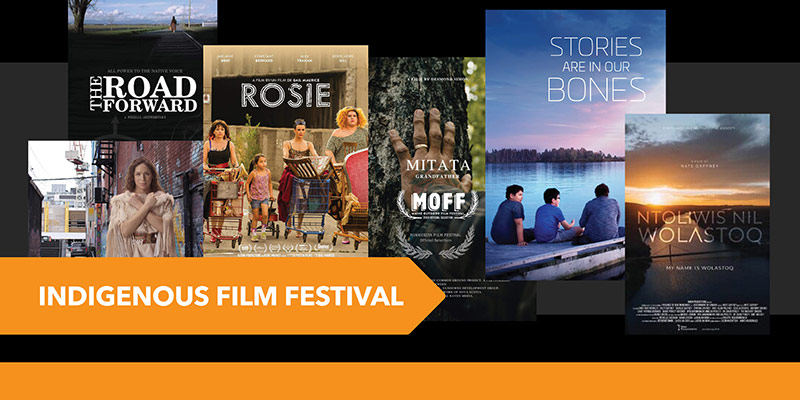A celebration of culture and storytelling at the UNB Fall Indigenous Film Festival
Author: Angie Deveau
Posted on Sep 19, 2023
Category: UNB Saint John

As part of the National Day for Truth and Reconciliation, the University of New Brunswick's (UNB) Saint John campus is hosting the Fall Indigenous Film Festival from Sept. 26 to 28, offering an opportunity to explore Indigenous cultures and stories, fostering meaningful conversations about truth, reconciliation and justice.
The festival will take place at 7 p.m. each night in the Ganong Hall Lecture Theatre. Presented by the UNB Saint John faculty of arts and the Lorenzo Society, it will feature films that explore and celebrate Indigenous cultures and stories.
Following the films, facilitators will lead a discussion about truth, reconciliation and justice. Attendees will delve deeper into these themes, embracing diverse perspectives and reflecting on the profound impacts of these stories.
Todd Ross, Indigenous advisor at UNB’s Saint John campus, said participants and facilitators will foster meaningful conversations that encourage reflection on truth, reconciliation and justice.
“This festival provides a space for dialogue, learning and understanding as we collectively explore Indigenous stories' cultural richness and complexity," he said.
Films at a glance
Tuesday, Sept. 26
Intro film: Woman Dress (six minutes).
A Two Spirit person named Woman Dress travels the Plains, gathering and sharing stories. Featuring archival images and dramatized re-enactments, this film shares a Cuthand family oral story, honouring and respecting Woman Dress without imposing colonial binaries on them.
Feature film: Rosie (one hour and 32 minutes).
An orphaned Indigenous girl is forced to live with her reluctant, street-smart, francophone aunty and her two gender-bending best friends in 1980s Montreal. Métis-Cree filmmaker Gail Maurice‘s first feature film showcases an atypical family that does not compromise on its vision of life.
Wednesday, Sept. 27
Intro films: Mitata (Grandfather) and Kehkimin (Teach Me).
Mitata (six minutes) This is the story of one family, their connection to their land and discovering their resilience. Mitata (pronounced "mee-da-da") is a Mi'kmaq word translating to "grandfather.” Created by Elsipogtog First Nation filmmaker Desmond Simon, Mitata is a celebration of a grandfather through the voice of his son and the eyes of his grandson.
Kehkimin (seven minutes): This documentary tells the story of the first-ever Wolastoqey immersion school. The school, located in the traditional territories of the Wolastoqey people (in what is today known as New Brunswick, Canada), provides an opportunity for children and adults to learn and reconnect with their language and ways of life.
Feature film: Ntoliwis Nil Wolastoq (My Name is Wolastoq) (47 minutes).
This film is a candid and powerful window into the movement to preserve and celebrate Wolastoqui culture and identity, including the calls to formally reclaim the name of the Wolastoq (Saint John) River. The producer, Elder Opolahsomuwehs (Dr. Imelda Perley), C.M., will join the group for a discussion after the movie.
Thursday, Sept. 28
Intro film: Stories are in Our Bones (11 minutes).
In this layered short film, filmmaker Janine Windolph takes her young sons fishing with their kokum (grandmother), a residential school survivor who retains a deep knowledge and memory of the land. The act of reconnecting with their homeland is a cultural and familial healing journey for the boys, who are growing up in the city. It’s also a powerful form of resistance for the women.
Feature film: The Road Forward (one hour and 41 minutes).
The Road Forward, a musical documentary by Marie Clements, connects a pivotal moment in Canada’s civil rights history - the beginnings of Indian Nationalism in the 1930s - with the powerful momentum of First Nations activism today. The Road Forward’s stunningly shot musical sequences, performed by an ensemble of some of Canada’s finest vocalists and musicians, seamlessly connect past and present with soaring vocals, blues, rock, and traditional beats. A rousing tribute to the fighters for First Nations rights, a soul-resounding historical experience, and a visceral call to action.
“This festival is more than just a series of screenings - it's an invitation to connect, learn and understand,” said Ross. “We invite everyone to join us for these thought-provoking screenings and discussions.”
All screenings are free and open to the public. To learn more about the films, please visit Indigenous Film Festival.
